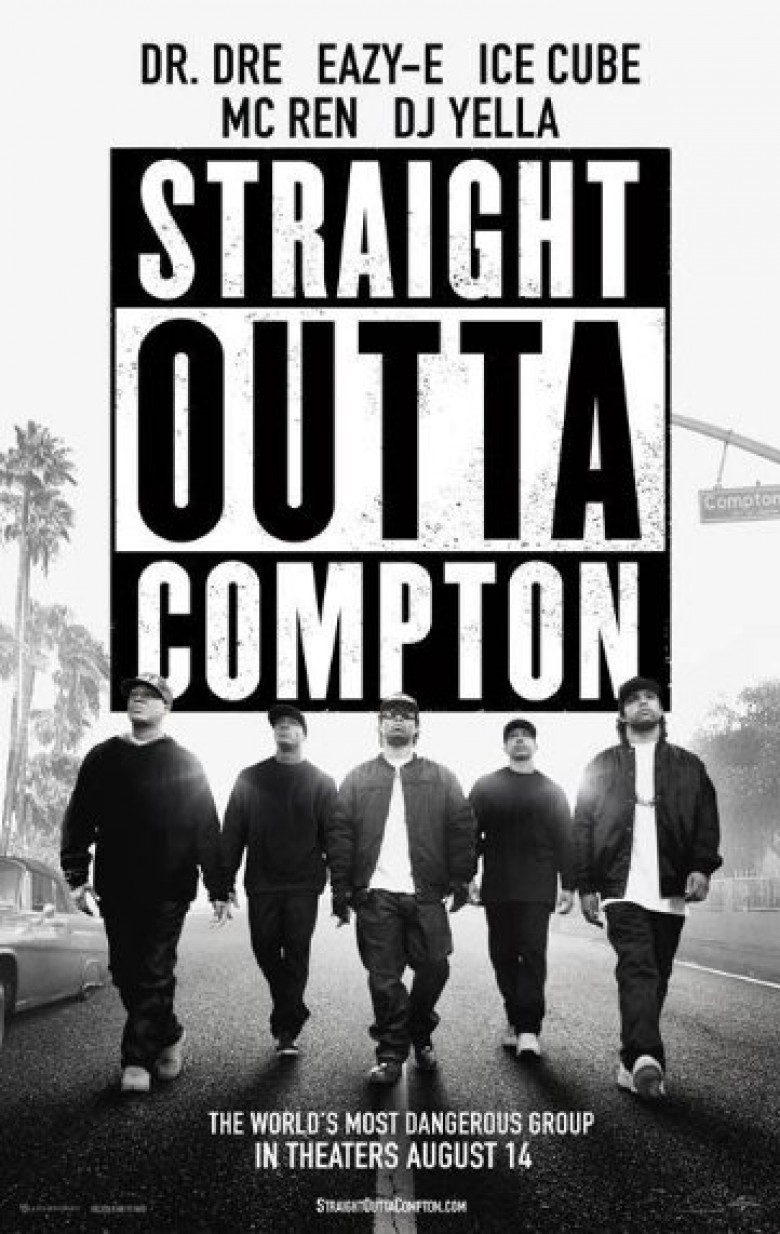“Speak a little truth and people lose their minds”
NWA biopic Straight Outta Compton is a conventional biopic. And I hate conventional biopics. It’s therefore a good thing its story is anything but. Between its time period containing an excess of racial and political strife to the void of a black voice filled by rap lyrics expressing said climate devoid of fear to the crisscross of music industry and gang life, this thing is so much more than merely a rags to riches tale of some kids from Los Angeles. It’s about a movement, a seminal point in America’s history that we’ve yet to overcome. The music is simply what propels it forward, commenting on and immortalizing its era of change. You can’t begrudge the producers for fixating more on this underlying message than the heinous acts that occurred parallel to it.
Dr. Dre and Ice Cube serving in this capacity is a double-edged sword. Their involvement irrefutably ensures authenticity and honesty in the details that made the cut as well as the portrayal of friend/brief adversary Eazy-E. But it also makes certain their personal transgressions are left ambiguous. That’s the thing about fictionalized accounts through rose-colored glasses as opposed to harsh outsider insight through documentary. Dre is going to let his character admit to doing things he regretted, but elaborating on those things—such as beating Dee Barnes up—isn’t going to make the cut. And that’s why she should very much use the film’s success as a platform to tell us what happened to her. While a crucial piece to Dr. Dre’s legacy, F. Gary Gray‘s film isn’t about just him or any other one person.
If there’s a lead in Straight Outta Compton it’s Jason Mitchell‘s Eazy-E. As the member no longer with us today, his life becomes the film’s central dramatic arc. Screenwriters Jonathan Herman and Andrea Berloff provide so much of Cube’s (portrayed by real-life son O’Shea Jackson Jr.) Public Enemy days and Dre’s (Corey Hawkins) Death Row Records escapades because the NWA story reaches beyond the conflict that split the outfit’s central trio apart to a hopeful reunion. It eventually comes back to E and his illness after the chaos wrought through his partnership with manager Jerry Heller (Paul Giamatti) comes to a head. He was the heart opposite Dre’s beats and Cube’s lyrics. He started Ruthless Records for them and as such deservedly sat atop the pyramid. Let’s just say he could have handled his position a little better.
Are details like J.J. Fad missing? Sure. A lot of the Ruthless history is absent in lieu of nods to Cube’s and Gray’sFriday collaboration. But that’s okay because this movie isn’t about the label. The eponymous record from 1988 with its anthem “Fuck tha Police” sparked a revolution. The sextet rounded out by DJ Yella (Neil Brown Jr.), MC Ren (Aldis Hodge), and The D.O.C. (Marlon Yates Jr.) were just twenty-year olds looking to breakthrough the club scene and become local heroes with E’s gangbanging cash at their backs. Cube was only nineteen when the album dropped and he sparked riots on tour while eloquently dressing down the authorities and detractors off-stage in interviews. They turned a universal anger into a weapon for change. Gangsta rap is blamed for a lot, but this good cannot be denied.
What makes the film worthwhile is this aspect shining above the bigotry. It educates and entertains someone like me who knew nothing about NWA besides recognizing a couple songs on the radio. It’s cool to see the myriad paths taken to this critical moment in music and race relations too with E almost run-down by cops destroying civilian houses with a tank battering ram, Dre skipping job interviews to listen to his vinyl collection, and Cube watching as a Crenshaw Mafia member walked onto his school bus with gun bared. The best sequences are those showing the oppressive nature of LA with cops jacking these kids for standing on the street and them turning the experiences into song. Chaos at a Detroit concert, the Rodney King verdict, NWA and Public Enemy’s lyric war—it’s all tense and raw.
Unlike many critics who say the film turns slow and/or boring afterwards, I actually found what followed just as captivating. Maybe I’m in the minority. I loved seeing Jackson Jr.’s portrayal of his father balking at things Heller didn’t anticipate a teenager would contract and money-wise. Similarly, watching Mitchell’s E fall prey to Heller’s kindness and quasi-parentage to allow the manager to take advantage is also great. Yes it was business and yes the moves made are still made today, but that doesn’t mean it was right to anyone involved. Stuff gets heavy as friendships dissolve, AIDS appears, and Suge Knight (R. Marcos Taylor) wreaks havoc. If anyone looks bad here it’s Knight. Can’t say I’m surprised the temper on display came out in real life to land him in jail for killing someone during production.
Straight Outta Compton‘s as much a document of an era as biography for its characters. It’s fun seeing Keith Stanfield‘s Snoop and Marcc Rose‘s Tupac, but they’re window dressing to the powder keg Dre gets into with Knight. Their goal is to contrast the inevitable volatility despite NWA beginning as a way to be productive outside the violence. Gray and company succeeds by showing the anger alongside joy. The label screws the talent, money drives family apart, and every other behind the music cliché joins the party. But the way they’re handled and the group itself aren’t like what you’ve seen before. This is an inspiring success story—admittedly glossing over many bruises—that’s timely to today’s climate. Rather than another rich men’s origin, the humor and drama here focus on the substance that cemented the fame.
Score: 8/10
Rating: R | Runtime: 147 minutes | Release Date: August 14th, 2015 (USA)
Studio: Universal Pictures
Director(s): F. Gary Gray
Writer(s): Jonathan Herman & Andrea Berloff / S. Leigh Savidge & Alan Wenkus and Andrea Berloff

